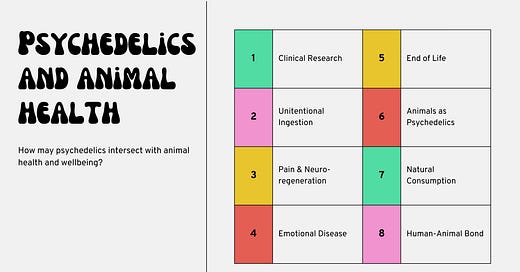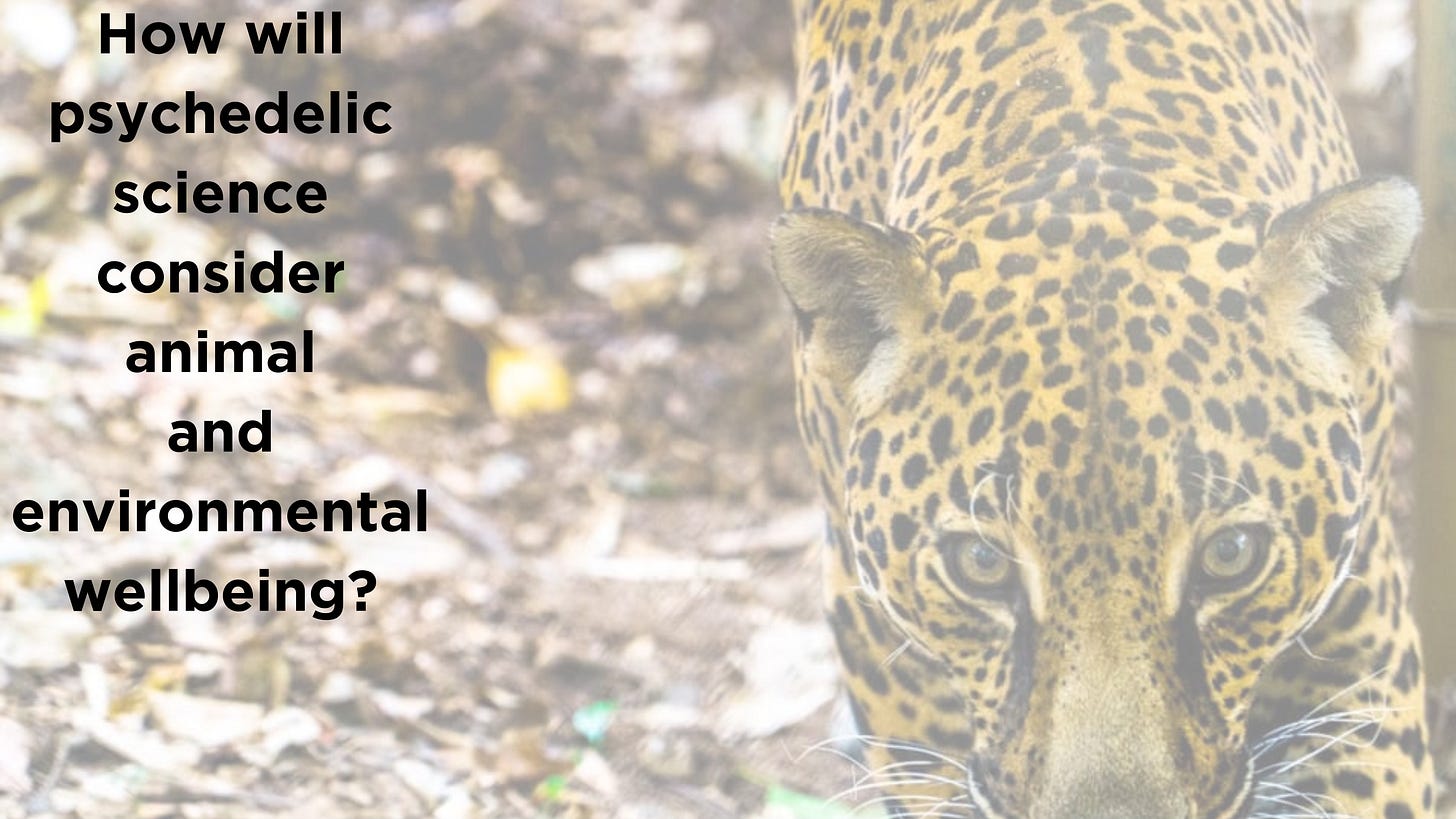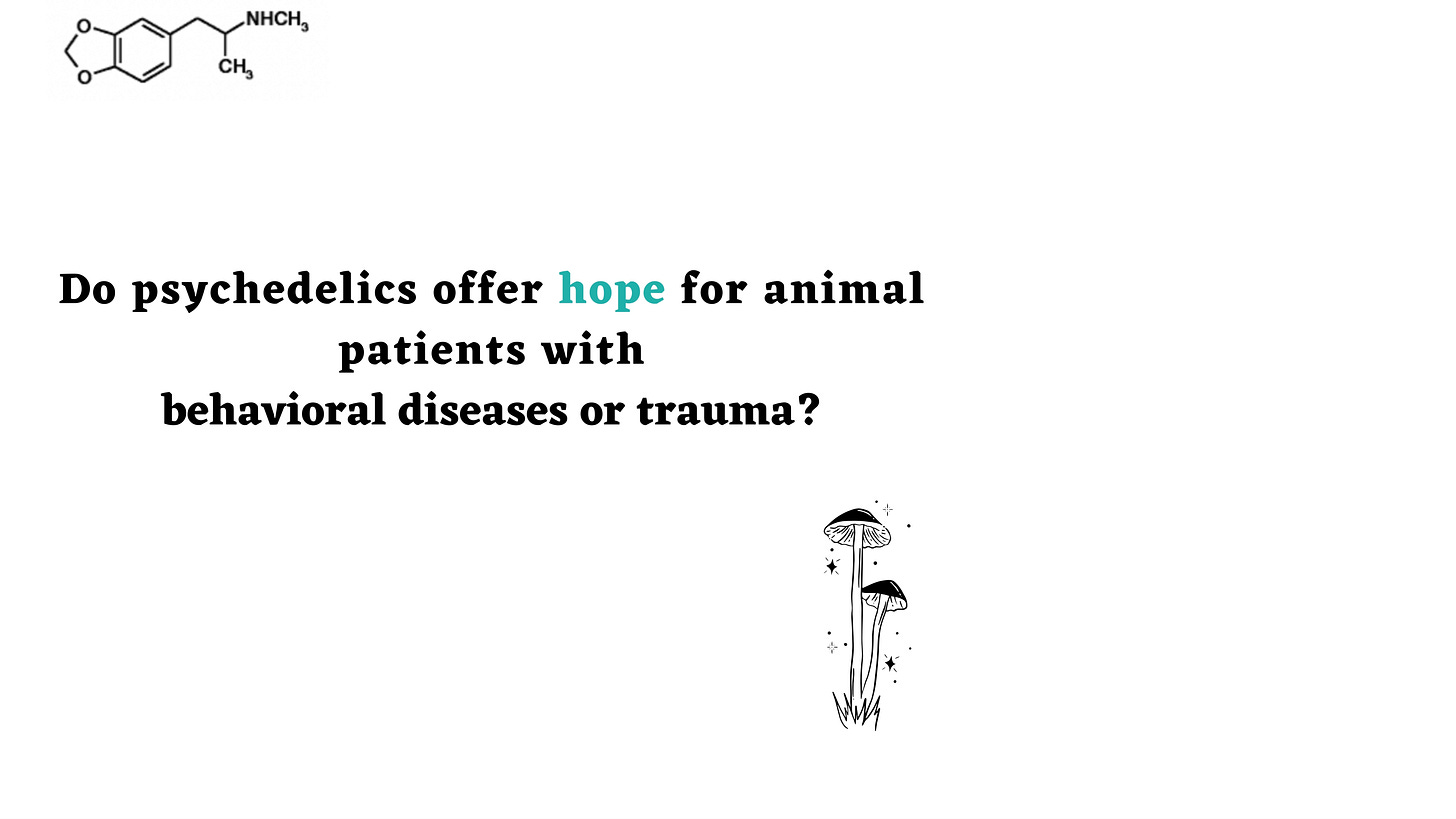As we are seeing a renewed interest in psychedelic medicines in people, what about animals, can they to benefit from psychedelic medicines as it relates to emotional or physical disease? For animal health professionals, the most relevant case discussion could be related to human inflicted traumas or behavioural conditions that may have no viable options besides electing euthanasia.
Are psychedelics substances something that we can safely discuss and explore for our patients? How do we navigate topics such as ethics & consent? While the animal health profession may likely avoid this discussion for some time, I suspect we will see an increase in questioning from pet parents as well as increased accidental exposure, just as we have been witness to during increasing cannabis legalization.
How can we provide harm reduction & education to minimize accidental ingestion and better serve those who may have received their own benefit from psychedelics who now wish to administer to their pet; hoping for a physical or emotional benefit?
I am here to say that THIS IS ALREADY HAPPENING and I suspect that consumption of psychedelic medicines by pets will only increase following renewed interest and accessibility.
What are some ways psychedelic medicines may apply to animals?
Clinical Research: While we may see animals and psychedelics as being a new discussion, they have been used in research for many years. Animals have been used in psychedelic research to investigate the pharmacological effects, mechanisms of action, lethal doses, potential therapeutic applications of psychedelic compounds for humans, and even for what I would consider harmful curiosity.
Psychedelics could potentially serve as valuable tools in veterinary research. By studying the effects of psychedelics on animals, researchers may gain insights into the neurobiology of consciousness, emotion, and cognition across different species. This knowledge could have implications for understanding animal behavior and in support of physical and emotional wellbeing.
Unintentional ingestion: Just as we have seen with cannabis, it is predicted that there will be a rise in accidental exposure to psychedelics as accessibility increases at home. At VeterinaryPsy, we are hoping to reduce this through harm & risk reduction education. We also need to explore and create educational opportunities for practitioners to learn more about these substances and how to best treat and support accidental exposure and any resulting psychedelic effect.
Pain Management and Neurogenesis: Psychedelics such as LSD and psilocybin have been reported to have analgesic and neurologically supportive properties in humans. While it is yet unclear how this would translate to animals, could psychedelics be explored as adjuncts or alternatives to traditional pain management & rehabilitation strategies in veterinary medicine?
Behavioral & Emotional Disorders: Some psychedelics have been studied for their potential to treat various mental health disorders in humans, such as depression, anxiety, PTSD and addiction. Is it conceivable that similar benefits, when combined with proper veterinary support, could be observed in animals suffering from behavioral issues like anxiety, reactive aggression, or stereotypies?
Do animals coming home from war also suffer PTSD? What about with other forms of other abuse that can present in many different ways? And what about animals that are used for entertainment or research who may suffer lasting psychological repercussions? For cases that have been unsuccessful using current forms of rehabilitation, could psychedelics play a role?
It should go without saying that careful consideration would need to be given to species-specific differences in drug metabolism and response; warranting scientific research within a One Health framework with a goal of therapeutic benefit in animals and not solely for the benefit of people.
End-of-Life Care: Animals, like humans, can experience distress and discomfort as they approach the end of their lives. Psychedelic-assisted therapy has shown promise in improving end-of-life experiences for humans facing terminal illness. Might psychedelics also be beneficial for animals in palliative care settings, helping to alleviate anxiety, fear, and existential distress? I think this will more challenging to navigate in general and likely not as applicable, but I do think about the potential of supplementary dosing to decrease the rate of cognitive decline or dementia in pets.
I am also interested in how psychedelics may help pet owners and practitioners with the grief surrounding pet and patient loss; a grief that is surely to become more impactful as we witness a deepening in the human-animal bond.
Animals as Psychedelics: It must be noted that there are animals that create natural psychedelic compounds that are being consumed, often in an ecologically irresponsible manner. Bufo Alverius (Colorado river toad, Sonoran desert toad), is a toad which naturally secretes 5-MeO-DMT, a very potent psychedelic substance. This toad is currently classified as threatened or endangered in some states.
Kambo, a secretion from the Giant Monkey Frog, is a non-traditional psychedelic compound that is applied through a superficial burn into the skin. It may give users a cleansing or purgative experience. Both of these substances do not require the animal to be killed for consumption, but growing interest places pressure on these animals with a spectrum of care to the animals wellbeing . It is perceivable that animal health professionals may be called to speak on this from a One Health perspective.
Natural Consumption: There are also many example of how animals naturally change their consciousness in the wild by consuming psychedelic substances. From reindeers who seek the Amanita muscaria mushrooms, dolphins consuming psychedelic puffer fish, and jaguars eating ayahuasca vine, which appears to produce a similar effect to that of catnip. Having a greater understanding of these natural events may be very important as we navigate this for our profession and our patients.
Human-Animal Bond: I believe the use of classical psychedelic medicines will inevitably change the way humans relate to and interact with animals, both wild and domestic. As psychedelics may produce a feeling of ego-dissolution and oneness it is my hope that this could have a positive effect on the human-animal bond and the environment. There is already research available to discuss the impact psychedelics could have on changing relationships towards animals and nature. I am excited to see this research grow but I am of the assumption animal health practitioners will also continue to notice changes in the exam room as it relates to choices made regarding a pets health or result in a more intense grieving process.
It is important to emphasize that any exploration of psychedelics in animal health would need to proceed cautiously and ethically, with scientific insight and consideration of animal welfare concerns. Further research is needed to determine the safety, efficacy, and appropriate use of psychedelics in veterinary medicine. Anything discussed in this blog should not be received as medical advice. It is purely for educational discussion. We invite you to join the conversation by reaching out with any questions.
Dr. Steve 🐾
Consultation Director | VeterinaryPsy
Additional Resources:
Intoxication - The Universal Drive for Mind Altering Substances
Psychedelics for Pain : Anaesthesiology
Psychedelics & Neurogenesis : Cell Rep
Psychedelics for Dementia : European Neuropsychopharmacology
Psychedelics for Grief: Journal of Psychoactive Drugs
Bufo Alverius : Psychopharmacology
Bufo Conservation Status : Oakland Zoo
Bufo Alverius: The New York Times
Kambo: The Guardian
Reindeer Amanita muscaria : Drug Discovery Today
Psychedelics and Animals :The Natural World and the Instinct to Alter Consciousness
Psychedelics and Human Relations: Int J Environ Res Public Health








